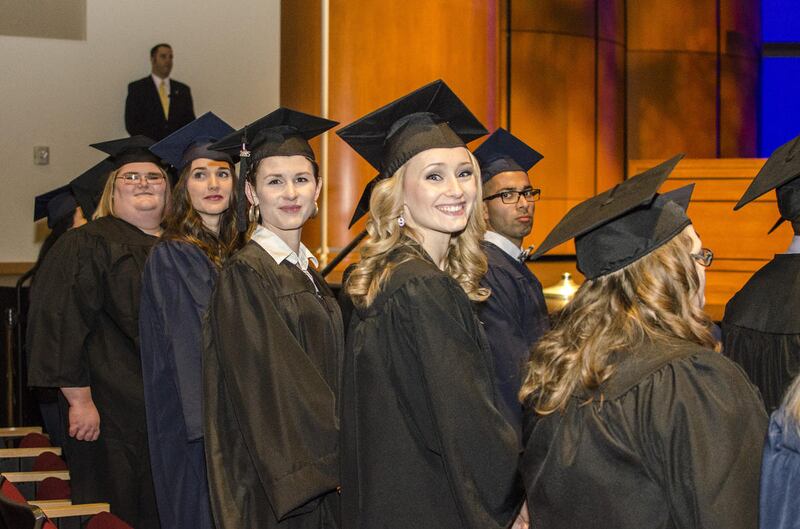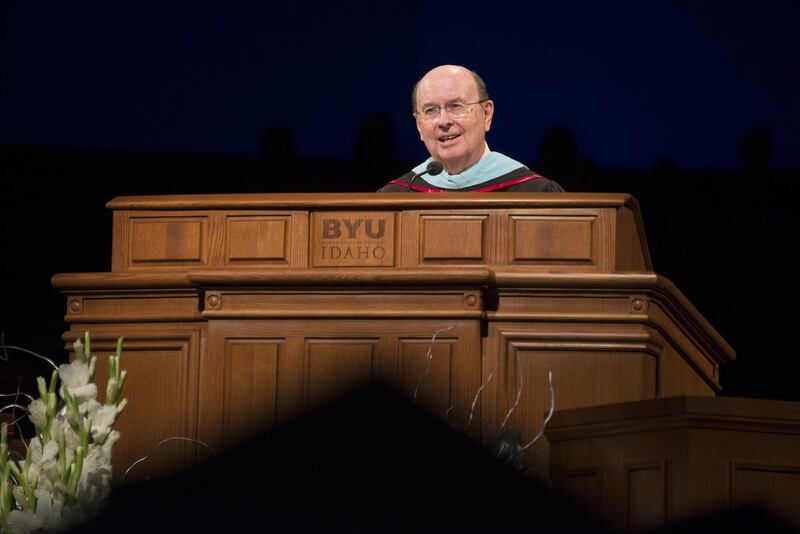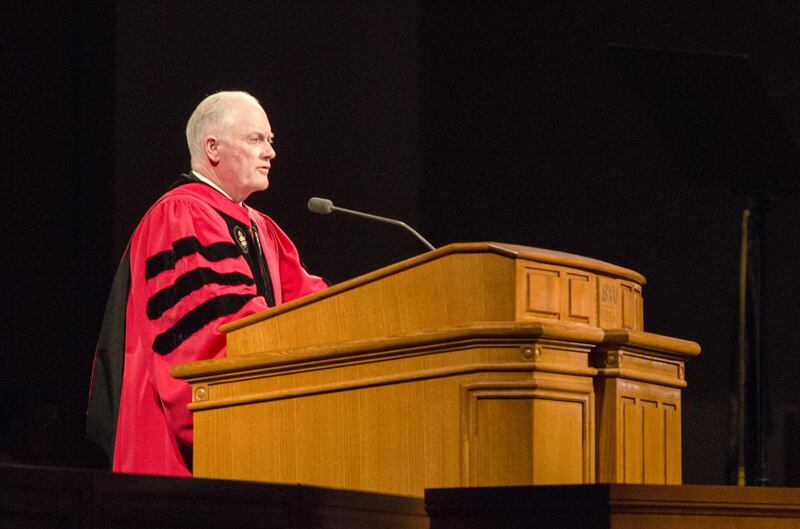Expressing gratitude and living the gospel of Jesus Christ are essential to achieving “the good life,” Elder Quentin L. Cook of the Quorum of the Twelve Apostles for The Church of Jesus Christ of Latter-day Saints told graduates during commencement exercises at Brigham Young University-Idaho on Friday night.
The event, held in the BYU-Idaho Center on the university's campus, brought students, faculty and supporters to Rexburg, Idaho. In addition to Elder Cook’s remarks, Elder Kim B. Clark, the commissioner of education for The Church of Jesus Christ of Latter-day Saints and a Seventy, and President Clark G. Gilbert, BYU-Idaho president, addressed graduates.
Elder Cook shared practical advice to help people be both happy and successful in achieving what has euphemistically been called “the good life.”
“I am deeply concerned that ‘the good life’ based on the life and teachings of Jesus Christ is now very secondary to a worldly view of ‘the good life,’” Elder Cook said.
When on the earth, the Savior inspired beliefs and established standards of conduct about what is moral, righteous and desirable, Elder Cook taught. “However, the principles and basic morality the Savior taught are under serious attack in today’s world. Christianity is under attack.”
This scenario is not new, Elder Cook said, referring to the Apostle Paul when he met philosophers in Athens on Mars Hill.
“Many in the academic world have long pointed to Aristotle’s advocacy of ‘intellectual contemplation’ as a blueprint for ‘the good life,’” Elder Cook said. “It is interesting that many of these same worldly philosophies that conflicted with early Christianity are still present in slightly different ways today. In addition there are many new philosophies that are in direct conflict with the gospel of Jesus Christ.”
What is considered moral has changed over time and an incredible movement away from moral conduct has changed the basis for what is now considered “the good life.”
“I assure you that following the Savior brings happiness in this life and in heaven,” Elder Cook said. “Some challenges are not just about good and evil. Some require us to make choices based on what is ‘best,’ not just what is good.”
Sharing the examples of two men he knew, Elder Cook taught how choices impact people's happiness in this life and the legacy they will leave for their posterity. His examples included one man who spent his life focused on a very successful career, and another man who spent his life focused on following the Savior.
“In the worst of circumstances, when everything else crumbles, family and the gospel of Jesus Christ are the essentials,” he said.
The most significant choices in life can be made by everyone — regardless of their economic circumstances, abilities, talents or opportunities, the LDS leader said. Although individuals may not have control over difficulties or trials in their lives, they do have control over their own faith and worship.
"Our faith is … a choice that we make," he said.
Recognizing it is still important to do everything in one's power to advance in both academic and occupational accomplishments, Elder Cook reminded graduates of some of the sacrifices that often accompany too much focus on ahievement.
It is through expressing gratitude and committing to the eternal principles established by the Savior — family, personal testimony and living the gospel of Jesus Christ — that individuals will be able to live “the good life.”
Elder Clark shared four principles — praying daily for the companionship of the Holy Ghost, "do not trust in the arm of flesh," praying for the help of angels and being the answer to someone's prayer for help — to consider as they move forward to their next phase of life.
“I pray that you will trust in the Lord and have his Spirit in your hearts so that you will be the Lord’s angels who bring the balm of Gilead, the good tidings of great joy, the healing and redeeming power of Jesus Christ to those who are lost, whose hands hang down, whose knees are weak and whose hearts are heavy,” Elder Clark said.
President Gilbert encouraged graduates to remember their heritage, recognizing the crops they harvested from the labors of others who have gone before, and encouraged graduates to re-invest to bless the lives of others around them.
mholman@desnews.com, @marianne_holman




